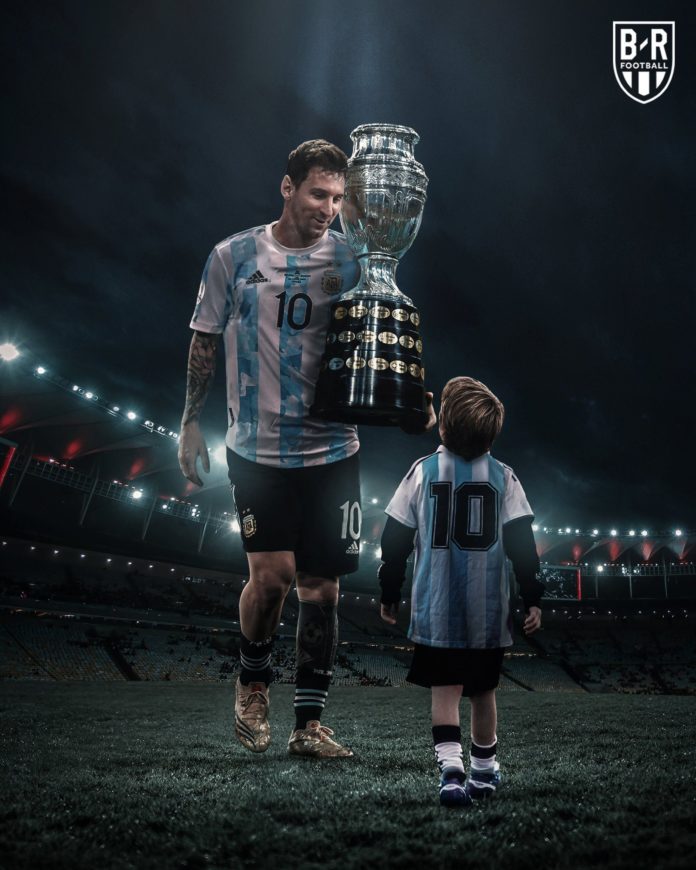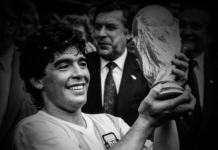Messi has battled an accusation throughout his Argentina career. When he was 13, his parents moved with him to Barcelona from Rosario for a team that had offered to pay for the treatment of his growth hormone deficiency. There was no contract, a verbal assurance at best. As we know now, it worked out better than anybody could have imagined. But it separated him from the Argentinean public.
He did not live his teenage years on the streets of Argentina. Many fans thought he did not belong. He was Catalan, some said. Argentina has an obsessive relationship with its football heroes. They need to grow up with them, spend their formative years in the rough and tumble of Argentinean football. Striker Carlos Tevez, who could never match Messi’s standing in the national team, always upstaged his more illustrious teammate in the public imagination. Tevez was el pibe del oro, an urchin-like figure of gold. A footballer of the masses.
After Messi failed to lead his side to World Cup glory in Brazil, Adidas launched its new shoe range that characterised the Barcelona star as pibe de barrio (a star of the local community). The advertising campaign tugged at the core of the debate. It attempted to present him as a figure that the Argentineans could identify as one of their own. His performance at the 2014 World Cup had bagged him the player of the tournament award. Now it was time to awaken the latent warmth that existed for him within the Argentinean society.
Yet, despite these machinations, Messi could never be seen as a local favourite. Argentina has not won a major international title since 1993. It was a burden that hung heavily in the air whenever La Albiceleste (The White and Sky Blue) approached an international competition. The shadow of Diego Maradona loomed large too. He had won the World Cup for his team in 1986. Messi had missed his chance in 2014. The pinch remained.
In his 2016 book Homo Deus: A Brief History of Tomorrow, the Israeli author-historian Yuval Noah Harari offers a perspective on divinity in the modern world shaped by reason and science. Specifically, that humanism vests its faith in the power of humans the way religions do in a god.
A modern god as defined by humanism is the human empowered by scientific and technological progress. This human is relatable, tangible, accessible and yet unequalled, often unfairly loaded with the hopes and dreams of mortals. A modern god is the source of unrestrained happiness that lesser men believe they can’t earn for themselves. A modern god is loved, admired and venerated for as long as the cloak of infallibility stay on. The moment it slips, this human starts feeling just as vulnerable as any of us. Much like Lionel Messi.
In the face of Messi, the people have nurture a notion that their demands having to be compulsively met. The gods aren’t allowed to falter like the rest of us; if they do, they reveal their human limitations and we don’t like that. Every time Messi takes the field donning the white and sky blue colors he must ensure an otherwise mediocre team punches above its weight. But if he fails to transcend the mediocrity that surrounds him, why would he even be looked up at in the first place?
It’s not like Messi is the first footballer to have been installed on Olympus; he isn’t even the first one from Argentina. And that is part of the problem. By all metrics, Messi is a superior player to Diego Maradona but he lacks the latter’s romance. The Maradona in the popular imagination today is more than a footballer, his flamboyant persona and extravagant lifestyle having gone on to define him as much as his preternatural skills on the ball have. The press loved Maradona. He was, despite all his shenanigans, a flawed genius – a people’s man.
Messi, on the other hand, is a product of a capitalist world. The world today is politically more stable than ever and footballers no longer manifest the political anger of the working class. Instead, they endorse a life of material comforts, and romance has steadily seeped out of the sport. It’s hard to look at players as more than professionals doing their jobs. This is why it’s harder to love Messi the way Maradona was loved.
Also unlike Maradona, Messi’s personality is blander. Off the field, he is fairly uninteresting and offers little for the press to cover. Barring a few occasions, his goal celebrations have been pretty basic compared to those of his peers, who prefer diving into a pool of self-indulgence.
His greatest strength, however, has been his mechanical consistency – something even Maradona lacked, although that can be overlooked because he has had bigger moments for history to remember.
Never has a player dominated club football the way Messi has for over a decade now, although few would deny his ridiculous consistency is a function of time. We are living in an era of superclubs where petrodollars have made it virtually impossible for the best talent to remain more fairly distributed. Sports science, coaching methods and awareness of diet and training are more evolved than ever. Nonetheless, what Messi has delivered is nigh impossible to replicate.
His consistency is on the verge of being boring. And that’s why failing to win a World Cup with a strictly mediocre squad shouldn’t come in the way of defining his legend.
It’s often overlooked that Argentina has already overachieved with Messi at the helm. And if three back-to-back finals in as many years is considered a failure, it only explains the outrageous nature of expectations. Two of these finals were lost on a penalty shootout and the third by a late extra-time goal. It’s not unfair to suggest Argentina haven’t had the rub of the green for too long. With more luck, Messi could have had multiple international trophies on his resume by now; if he doesn’t, it’s been by the thinnest of margins.
The doubts about his commitment to his country are long gone. He sat out Barcelona’s last game of the season, an indication of his priorities. Technically, he is now a free agent, without a club at all. Lionel Messi of Argentina and Argentina alone.
The sense of urgency has only increased and this is a particularly emotional triumph for player and country in the wake of Maradona’s passing in November. Perhaps nowhere more so than in Rosario, Messi’s home town.








